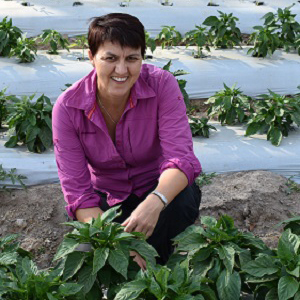
Principal Plant Pathologist and Team Leader Microbiology and Entomology
Horticulture and Forestry Science, Department of Agriculture and Fisheries, Queensland Government
Dr Cherie Gambley also leads a Euphresco plant health research project on Resistance breaking strains of Tomato spotted wilt tospovirus: distribution and evaluation of their impact on tomato and pepper production. The Euphresco network coordinates transnational research programmes, by developing a common strategic research agenda and making the best use of limited national plant health research resources to avoid duplication to achieve the best use of research outputs. For more information on Euphresco contact the country coordinators at the Department of Agriculture, Water and the Environment’s Chief Plant Protection Office on acppo@awe.gov.au
I first started working for DAF in early 1996 as a young scientist, recently graduated with a Bachelor of Science from the University of QLD majoring in microbiology and plant pathology. Later I did my PhD in plant virus epidemiology. I’ve been in my current role as a Principal Plant Pathologist for about five years and a team leader for the last 18 months. The team I lead is a combination of research plant virologists, bacteriologists and entomologists. It is a great mix of disciplines with a strong underlying base in molecular diagnostics, detection and identification.
My favourite non-work activity is spending time outside. I love hiking, mountain biking, swimming, camping or just being in the garden, as long as I’m outside I’m happy. I’ve been lucky enough to travel and do many of these activities overseas in places such as Italy, Spain, New Zealand and South America, although I do also love the myriad of options available in Australia.
My work focuses on research and development for crop protection in horticulture, particularly for virus and bacterial diseases. As such I don’t really have a typical day. Instead, my time is a mix of research planning, reporting, field, lab and glasshouse work, supervising students, responding to industry and biosecurity requests and delivering extension activities. It’s a very dynamic role which I enjoy immensely—there is never a dull moment!
Over the years I’ve found the most challenging aspect of my job is the short research funding cycles, typically only three years. It is often difficult to build substantial solutions to research questions within three years. It can also be very difficult to build teams with such short-term contracts. These short cycles result in slower resolution of complex science questions and occasionally a complete stop to that avenue of enquiry if funding agencies change priorities. It also makes succession planning within research teams challenging.
The most enjoyable aspect of my job is the opportunity to interact with people from many different demographic groups and where this takes me, physically. From discussions of disease management with growers or agronomists in regional production fields, sitting around tables discussing policy and procedures with federal and state biosecurity agencies, and presenting research results at international conferences, to disease surveys in Papua New Guinea and Cape York. The topics are as varied as the locations! The broad range of topics I work across is a continual stimulation and I am always learning something new, from all the different demographic groups. I find this very rewarding.
A PhD teaches many things, high level detail about the topic under study, a structure on how to investigate a problem, technical problem solving, scientific writing, and above all else resilience! It has allowed me to continually adapt in my career to new directions and to adopt new research tools. Most recently, I’ve become excited about the potential for innovative DNA and RNA based strategies for crop protection. In the field of plant pathology there is increased interest in plant–microbe interactions and how these can be manipulated for crop protection. Information in this area is ever expanding and it’s a great time to become involved.
Find something that piques your interest and follow that path. It is easy to achieve in areas that you are passionate about, the time you need to invest to understand an area of research then becomes an enjoyable pastime rather than feeling like work. Everything will follow on from there. You will learn effectively because you’re interested and then you’ll find the creative research ideas will begin to flow. Demonstrated enthusiasm will also mean others are more likely to believe in your ideas and thus invest in helping you realise them.
© 2025 Australian Academy of Science